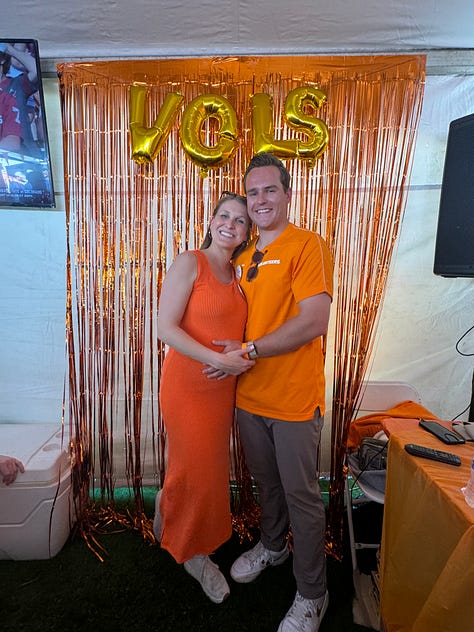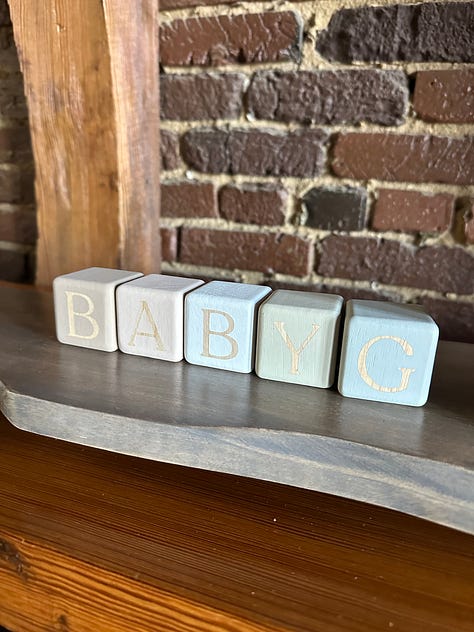Parenting & Operating Systems
Thoughts on fatherhood through the lens of 'Figuring It Out'
Hi Everyone!
Happy Thursday, and welcome back to another edition of The Gunn Show - making a rare late in the week appearance. The last couple weeks have been chaotic with travel and off-season strategy meetings, so we’ve gotten a bit off schedule. But things will be quieting down here soon and I’m looking forward to having more time to get back on the regular cadence.
I normally kick this newsletter off by saying that I hope you had a fantastic week, but today is the rare one where I can say that I know for a fact many of you did. Why is that? Well, because a great number of us were able to spend the last past weekend together in Knoxville for our annual pilgrimmage to Neyland Stadium.
For those reading yet unaware, this marks year 10 of our yearly trip to catch a Volunteer Football game in live action. What started back in 2015 as a ‘college football introduction’ trip for two of my Amherst Baseball teammates has since grown into a big family affair, one that brings together people from all different walks of our lives - parents, hometown friends, college teammates, wives, fiancés, and more. It is always one of my favorite weekends of the year with the opportunity to tie so many strands of life together, and this year’s edition did not disappoint. From Friday on we had much to celebrate with two engagements, a birthday, and a Sunday Shower for Baby G - all on top of a Big Orange overtime victory over the Florida Gators.
In a trip full of great ones, here are some of our favorite pictures from the weekend:






Now, onto this week’s topic. Baby G’s shower came at an appropriate time as January - and thus parenting season - are fast approaching. Naturally I’ve been spending a lot of time thinking about what is ahead, specifically around one important question: how the hell do you do this Dad thing?
Today’s newsletter is an attempt to tease some of those thoughts out. Hope you enjoy, and look forward to the next time this newsletter hits your inbox!
- CG
Thinking On - Parenting, Operating Systems, & ‘Figuring it Out’
Our baby shower this past weekend presented a great opportunity to reflect on the question of what it means to be a Dad - and specifically, what it looks like to be a good one. Because while we were surrounded by many people from various walks of our lives, there was one demographic that stood out to me in conversation amongst the rest - the ‘Dads’ in attendance, most notably my own father.
I’m a big believer in the value of what I call exemplars (or what others might call role models) - people that you can look to as a source of inspiration, ones that embody a set of ideals or characteristics you wish to one day live yourself. So naturally, as a first time father-to-be, I’ve been thinking a lot about what I may (or may not - considering how little attention I naturally payed for a long time) have absorbed from the many fantastic Dads I’ve been surrounded by throughout my life. Because while the time is now ripe to ask for the answers to that question, I’d be remiss if I didn’t realize that they have been showing me what some of those look like for many years.
And while I’ve taken various things from each of them, there is one thing that stands out above the rest: everyone does it differently. Every Dad is their own version, answering the question in their own way. Give 50 different Dads the same test and you will get 50 unique ways of parenting back.
Why is that? Well, because from my perspective it is due to the fact that parenting is not as simple as multiple choice; the ‘Dad’ test doesn’t come with pre-determined bubbles for you to neatly shade in like you did on your high school scantrons. Rather, parenting is much more like an open-ended test, one that challenges your creativity and critical thinking by forcing you to formulate your own responses - both to the world around you and to the child in front of you. There is no small, single subset of options because parenting doesn’t measure your recall so much as it measures your ability to adapt.
In an environment with no scripts, there will naturally be an infinite amount of possible outcomes. Which means one thing above all else: simply, you have to figure it out.
As I’ve asked around - to both people that have been on this journey for many years and those just beginning - this is by far the most common piece of advice I’ve gotten in return: You will figure it out, if only because you have to figure it out. There’s no other choice, and no-one gets the answers to the test before you have to take it. So you have to find them as you go. If that doesn’t make parenting a beautiful microcosm of life itself, then I don’t know what else does.
So as I’ve heard that bit of advice and thought more deeply about it, it’s made me come to think of parenting as a ‘skill’ that we are learning daily from the moment we are born. Why? Because from my vantage point the best description of life is as a constant see-saw of problems and solutions, a game in which each of us must navigate through the world facing a never-ending series of new challenges and doing our best to solve them. Whether in school, at work, or elsewhere, life is like a self-updating test that provides us with new questions we have never seen before, daily. Surprises are a certainty, but if we are to keep moving forward the only way to do so is to somehow, someway find a solution. To figure it out.
Returning back to the question of how to be a Dad, I think I’ve started to formulate a guideline for how I want to go about it: the goal, put simply, is to help your kids figure out life as best you can. In a sense, you are merely trying to teach them the same skill that you yourself are learning along the journey - the ability to problem-solve, to be faced with something new and find a path to a solution. Ultimately what that means for me is the following - I don’t want to give my kids the answer to the test so much as I as I want to help them find them for themselves. I want to teach them how to figure it out, whatever ‘it’ is.
The more I’ve thought about this concept of parenting and problem-solving, the more the technology nerd in me can’t help but see an analogy to the world of computers.
With our increasingly digital world, each of us has become well familiar with the concepts of ‘hardware’ and ‘software - the former serving as the nomer for the physical nuts and bolts of the computer while the later relates to the programs and instructions that make it tick.
Humans, while different in a myriad of ways, are more akin to computers than you might think. The things we see in humans are our own versions of hardware - things like our bones, our skin, our eyes and more that give us our physical form. But we also have our own version of software - our minds - that are always running, like a program in constant update mode according to the information in the world around us. And while it is our hardware that sets our foundation, it is ultimately our software - our ability to think, to learn, and to problem solve - that determines how successfully we will navigate through life.
Each of us comes pre-installed with our own version of a fundamental human ‘operating system (OS)' in the same way your Apple MacBook would arrive with MacOS at the ready. The starting point of that software is important in that you want to be running the most ‘up to date’ version possible - after all, who wants to run v1 when v17 is available? But as we move through life we quickly come to learn that updates are required - it is easy for an OS to fall out of style, and some are more suited for certain phases of life than others. The temper tantrums from our BabyOS are not likely to do us any favors as we head to school, in the same way that the procrastination function from SchoolOS won’t set us up well for the workforce. As the seasons of life change and the demands with them, so too must the software running our lives.
To do so requires the mental equivalent of hitting the “Install Update” button,
putting your brain into debug mode to take a cold, hard look at the programs you are using to process the world. As life presents new challenges, some of our programs will be tested - some will be close to right but just missing a small piece, while others may be completely off base. Solving problems in the worlds simply means updating our personal OSs to keep the things that work and discard what no longer applies.
The beautiful thing is that just like when Apple pushes that big red update alert to your phone, life will continue to present countless opportunities to make the switch to a better OS. So much so that we could think of our day-to-day lives as a constant stream of ‘Install Update’ push notifications, with every interaction or decision a chance to put our mental software to the test.
But alas, there is a catch - only you can be the one to make that update. People can make suggestions, but the decision ultimately is yours to make. In the same way that you have the choice of whether or not to update your phone, you have the choice of whether or not to ‘learn’ from the world around you and press your personal ‘install update’ button at the right time, in the right place.
And that, to me, is what much of parenting is about.
With all of this in mind, parenting to me is thus akin to becoming a software engineer. Each of us has to learn how and when to update our personal operating systems, our set of programming and solutions for how we navigate the world, with the same being true for our kids. And while none of us have this process mastered to a T, it is almost certain that when it comes time to be a parent we will be running a higher level lifeOS version than our children. The reason is simple - time, and the experience that comes with it, has presented us with more opportunities for updates along the way.
So while we never stop adjusting our own programming, parenting thus becomes about the process of helping someone else update theirs. With this recognition in mind, the onus of a parent thus becomes to coach, massage, and teach our children how to make updates to their own systems. We must teach them how to think for themselves so that they are capable of solving whatever the world demands of them.
Many times, I think, parents go about this by trying to tweak their child’s OS to be more like their own. But while this is a good start, parenting only from this standpoint is likely to create some blind spots along the way if only because while the experiences of our children may somewhat mirror our own, they will not be carbon copies. It is a near certainty that our kids will face problems in the worlds that we have never seen ourselves, ones that our own OSs are not positioned to solve. When those moments come, our kids will have to be equipped to make their own updates, to find their own answers. Simply put, they will have to figure it out, in the same way we are trying to ourselves.
And so as I zoom out on the process of becoming a Dad, I know that there is a lot coming - both for me to learn, and for me to teach. But if there are two things above all else I’m hopeful to pass along to my kids they are the following - I want to make sure they have the ‘install update’ button written into their software and that they know how to use it when the time is right.
Because ultimately I want them to be able to do the same thing I’m going to be trying to do along the journey with them: figure it out.
Reading
Dad Mode - Evan Armstrong, Every (~8 min)
The first of two ‘dad’/parenting shares this week, this from Evan Armstrong of Every. There’s a lot of great insight in here centered around the concept of parenting being a forcing function for personal growth, including this banger of an opening line:
The secret to personal growth isn't in self-help books or ayahuasca trips. It's in a $1.99 pregnancy test from Target.
Worth the read if you get the time.
Burn the Playbooks - Packy McCormick, Not Boring (~7 min)
Just like there is no one way to parent, there is no one way to educate. But in a world that is becoming increasingly specialized, this was a great read from Packy on the value of a broad education, stemming from some recent comments/research on the inability of modern students to read in-depth books from start to finish. There are a number of reasons why, such as declining attention spans in a hyper-digitized world, but Packy calls out one in particular: success has been over-playbooked, which has led to a broader issue:
The problem isn’t that kids are competing or studying hard, but that they’re narrowing.
Great food for thought.






Thanks for the “shout”, my son!!